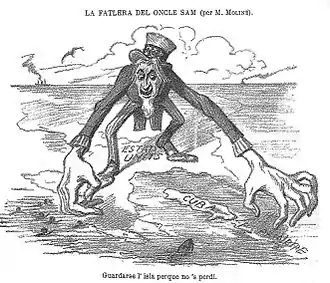
Anti-American sentiment is perceived to be deeply entrenched within elements of Spanish society, with several surveys conducted concerning the topic tending to back up that assertion. Spain ranks among the highest countries in terms of the level of anti-Americanism in Europe.[1] According to a German Marshall Fund study, feelings towards the United States in Spain were among the least favourable in Europe, second only to Turkey.[2] The sentiment has been historically far from being only a left-wing nature but, the United States is view very negatively by right-wing factions in Spain.[3]
The consideration of the Spanish–American War in 1898 as point of origin of anti-Americanism in Spain has been common in historiography although the extent has been recently disputed,[4][5] as negative stereotypes about the United States and Americans had started during the US Declaration of Independence in 1776.[6] The spread of prejudices and clichelés against the United States that were common in Europe in the 19th and the 20th centuries found a fertile ground in Spain.[7] In the 19th century, Spanish anti-Americanism, which was staunchly conservative, developed by a discourse of Panhispanism, which framed the US as an enemy of Spanish interests and of Catholicism.[8]
The 1898 war was perceived in the US as a "splendid little war" but as a national disaster to many in Spain.[9] However, despite the attempts from the most obstinate right-wingers, who continued to engage into feeding anti-American sentiment, the immediate aftermath left a focus on self-criticism and a grave crisis in the "national psyche", rather than a prevalence of revanchist stances in public opinion.[10]
According to Alessandro Seregni, 20th-century anti-American sentiment was built upon two different political cultures ("groups" or "families") in Spain: one right-wing and another left-wing.[11]
During the Second World War, unabashed right-wing anti-Americanism, led by the Church, the Armed Forces and the Falange had Falange members become sponsors of a worldview underpinned by hispanidad, which clashed with the Monroe Doctrine.[12] After the end of the war, right-wing anti-Americanism became more defensive. Criticism and condemnation of American imperialism was widespread in Spain in the 1960s and the 1970s.[13] The US involvement in foreign nations in the 1970s (often endorsing anti-democratic regimes) further tarnished the country's reputation in left-wing sensibilities.[14]
For many authors, the higher prevalence of anti-Americanism in Spain to that nearby nations is because of the memory of the 1898 war and the left-wing resentment of the US partnership with Franco.[13] Also, the Pact of Madrid to install US military bases in Spain in 1953, the Americans' lack of enthusiasm for the Spanish transition to democracy in the 1970s, the US endorsement of far-right dictatorships in Latin America during the Reagan administration, and the invasion of Iraq (including the killing of José Couso) are also cited as events that fuel anti-Americanism.[15] Spain was even the European country with the highest levels of opposition in public opinion to the Iraq War.[16]
References
- Citations
- ↑ Fernández de Miguel 2006, p. 258.
- ↑ Chislett 2005.
- ↑ Fernández de Miguel 2006, p. 257.
- ↑ Fernández de Miguel 2012, p. 22.
- ↑ Rodríguez Jiménez & Fernández de Miguel 2011, p. 10.
- ↑ Rodríguez Jiménez & Fernández de Miguel 2011, p. 19.
- ↑ Fernández de Miguel 2012, pp. 6–7.
- ↑ Rodríguez Jiménez & Fernández de Miguel 2011, p. 7–8.
- ↑ Rodríguez Jiménez 2010, p. 78.
- ↑ Niño 2005, p. 72–73.
- ↑ Neila 2018, p. 767.
- ↑ Fernández de Miguel 2006, pp. 260–261.
- 1 2 Montero Jiménez 2014, p. 207.
- ↑ Fernández de Miguel 2012, p. 425.
- ↑ González Esteban 2011, p. 208.
- ↑ Benito, Carlos (11 July 2016). "¿Somos los españoles anti americanos?". Ideal.
- Bibliography
- Chislett, William (2005). "El antiamericanismo en España: el peso de la historia" (PDF). Documento de Trabajo. Real Instituto Elcano (47). Archived from the original (PDF) on 2020-06-20. Retrieved 2020-06-18.
- Fernández de Miguel, Daniel (2006). "El antiamericanismo en la España del primer franquismo (1939-1953). El Ejército, la Iglesia y Falange frente a Estados Unidos". Ayer (62): 257–282. ISSN 1134-2277.
- Fernández de Miguel, Daniel (2012). El enemigo yanqui: Las raices conservadoras del antiamericanismo español. Zaragoza: Genueve Ediciones. ISBN 978-84-940186-3-3.
- González Esteban, José Luis (2011). "El antiamericanismo en España: el caso del conflicto de Irak, la prensa y el asesinato de José Couso". In Ardavín Trabanco, Carlos X.; Marí, Jorge (eds.). Ventanas sobre el Atlántico: Estados Unidos-España durante el postfranquismo (1975-2008). Valencia: PUV. pp. 207–218. ISBN 978-84-370-8031-4.
- Montero Jiménez, José Antonio (2014). "Antiamericanismo y conservadurismo en España" (PDF). Iberoamericana. XIV (55): 205–212. Archived from the original (PDF) on 2020-06-19. Retrieved 2020-06-18.
- Neila, José Luis (2018). "Americanización y antiamericanismo en el universo narrativo y cultural de Madrid: el Museo Nacional Centro de Arte Reina Sofía como espacio metatextual". Sociología Histórica. Murcia: Universidad de Murcia (9): 763–792.
- Niño, Antonio (2005). "Las relaciones culturales como punto de reencuentro hispano-estadounidense". In Delgado Gómez-Escalonilla, Lorenzo; Elizalde, Mª Dolores (eds.). España y Estados Unidos en el siglo XX. Madrid: Consejo Superior de Investigaciones Científicas. pp. 57–94. ISBN 84-00-08307-5.
- Rodríguez Jiménez, Francisco Javier (2010). ¿Antídoto contra el antiamericanismo?: American Studies en España, 1945-196. Valencia: PUV. ISBN 978-84-370-8330-8.
- Rodríguez Jiménez, Francisco Javier; Fernández de Miguel, Daniel (2011). "La larga durabilidad de los estereotipos. El peso de los prejuicios en la visión española de Estados Unidos". Cuadernos de ALDEEU – via Biblioteca Virtual Miguel de Cervantes.